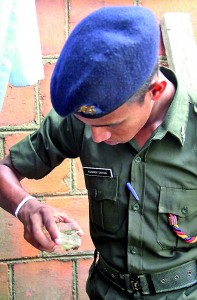News
Once bitten twice shy? Not in dengue-ridden Lanka
Detachments of the armed forces backed by police and Public Health Inspectors moved from street to street and garden to garden in main towns in the Western Province this week. Their target: the destruction of mosquito breeding grounds.
In a three-day campaign in the Colombo city they searched more than 38,000 houses and private lands, in some instance warning the public to clean up their gardens, gutters, drains etc. while legal action was instituted against some.
In the next few days they aim to check up to 117,000 houses.
The primary focus of the dengue awareness campaign this month is on cleaning public areas, finding mosquito breeding grounds, smoking mosquito-infected areas and creating awareness of hazard reduction, Health Services Director-General Dr P.G Mahipala said.
The campaigns being conducted in the Colombo, Kalutara and Gampaha districts in the Western Province will continue throughout the next three months.
More than 60 per cent of the dengue cases in the country have been detected in the Western Province.
Of the approximately 18,506 dengue cases reported this year 10,524 have been from the Western Province.
“Our main focus is the city of Colombo,” said Dr Mahipala.
“We ask people to keep their home, school and work premises clean. Each house with a clean environment will be handed a green sticker and our main focus is to ensure that all houses receive this sticker,” he added.
Dr Hasitha Tissera, a specialist attached to the Epidemiology Unit at the Ministry of Health, said, “The dengue situation in Sri Lanka escalated from 2009, and there is a further risk of it increasing as well this monsoon season”.
He said the aim is to reduce deaths caused by dengue.
Dengue has claimed the lives of 50 these past six months alone, and the City of Colombo itself has reported the highest number of dengue cases. Health officials suspect that this will increase with the forthcoming rainy season.
Dr Tissera added, “Common breeding grounds for the dengue mosquito include discarded containers (48 per cent), water tanks (22 per cent), discarded tyres (0.7 per cent), gutters (0.2 per cent). We visited 8641 schools and in 4469 of these schools we discovered potential breeding sites for these mosquitoes – 225 of these places were confirmed positive.”
Entomological surveys conducted in 2014 also showed the discovery of 19 dengue mosquito-positive areas in 25 government institutions visited.
The lack of public participation in clearing infestation-prone belongings and local environments has caused primary concern among the officials. Many of them believe that this virus, which has no cure, could only be countered through public co-operation.

Waging war against dengue: An army personnel checks some water in an open plastic container. Pic by Indika Handuwala
“Once an area is reported we visit the premises, inform the residents and make them aware of the situation, Dr Tissera said. “Regardless of that when we visit the same premises two weeks later the situation still remains the same. It is the behavioral pattern of people that must be changed.”
Colombo Municipal Council Chief Medical Officer of Health, Dr. R.L. de S. Wijayamuni, said, “Public interest in these awareness campaigns is minimal. Most people wait till our officials come and clean up their premises, quite often just looking out through their windows at the clean-up operations.”
A high number of dengue threats have been reported from the Fort, Maradana, Maligawattha and Dematagoda areas, he said.
“A health official was sent to inspect the railway track. He walked along the track from Fort to Dematagoda and found a colossal amount of containers thrown out of train windows.
“The death of a 28-year-old pregnant mother reported in Maligawattha was in the vicinity of a railway track,” he added.
A massive programme was due to be conducted along the Maradana, Maligawattha and Dematagoda rail tracks yesterday.
“The reason we resorted to making arrests is, because if we did not make arrests the people would not take much notice,” said the Director of the Police Environment Protection Division, SP Quintus Raymond. “This makes them take extra precaution. There is no cure for dengue, yet people still turn a blind eye to it. It is only when a death occurs that they turn and point fingers at the health authority.”
“There have been many occasions where we have made arrests and filed cases in court. A fair warning is given to each household prior to the arrests,” he said.
Dengue has claimed the lives of approximately 1190 lives in the past seven years.
Meanwhile the incidence of dengue fever has increased by 40% in June this year compared with the figure last year. The number of patients in June this year is over 450 while last year the number was 321, according to Epidemiology Unit of the Ministry of Health.
The total number of patients has also increased compared to last year by 100 according to the Unit.
A CMC source said the Public Health Department has started a new programme in some areas where inside of homes are being sprayed instead of the usual practice of spraying and fogging in the vicinity of homes. This has resulted in equipment worth millions of rupees lying idle for more than a month. The incidence of dengue has increased during this same period, the sources said.
“People have been affected by this sudden decision as the routine mosquito control programmes had been stopped during the peak dengue season,” the source added
| Dengue battle goes to smart phones
The Colombo Municipal Council (CMC) will this month launch the Social Media App where citizens in Colombo can send information including photos about mosquito breeding sites to CMC through smart phones.Using this app, residents can also check for high-risk areas and other information with regard to dengue fever. It will enable the public to be partners in dengue control through this effort, a CMC official said. |

